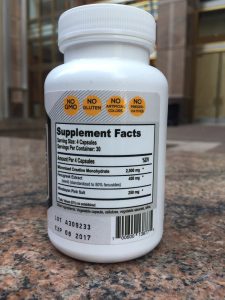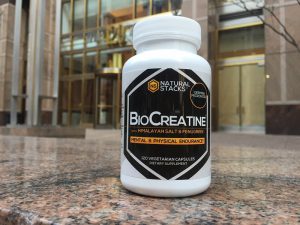The Overview
It turns out gym rats have been using nootropics for longer than almost anyone else — even if they didn’t know it. Research-backed strength-builder creatine monohydrate — common for most high level athletes, generally safe to use, and not a banned performance enhancer — actually has some impressive nootropic properties, and brain supplement manufacturers are taking note. Though it’s naturally found in many foods, supplementing creatine has a whole host of interesting properties for muscles, the brain, and energy systems.
Natural Stacks — makers of Smart Caffeine, MagTech (our favorite brain magnesium supplement), and CILTEP — are getting in on this trend with BioCreatine. Their flagship creatine supplement, BioCreatine combines research darling creatine monohydrate with two compounds that may boost creatine absorption in the brain and body. Read below to see why all our testers liked this supplement, how the effects manifest differently for everyone, and some must-know tips to take it properly.
 The Ingredients
The Ingredients
Micronized Creatine Monohydrate – 2,500 mg
Creatine monohydrate is one of the world’s most-researched supplements. It’s primarily known for increasing muscular endurance and strength, and it’s one of the few supplements that is almost guaranteed to improve athletic performance (and contrary to some rumors, it’s not a banned substance). With few side effects reported, it helps body cells rapidly produce ATP (think of this as a cell’s “fuel”); in times of stress, creatine molecules release energy to cells; when supplemented, this can cause increases in strength and brain, bone, muscle, and liver function.
While creatine is most noted for its strength-enhancing properties, it’s also a well-researched and potent nootropic. By helping cells maintain and boost ATP levels, it can help reduce the buildup of toxic compounds within cells, improve neurotransmission, boost memory, protect against brain glucose deprivation in neurons, and can protect neurons through several chemical processes due to its ability to donate phosphate groups through ATP. It may even promote neuron growth and has been shown to promote recovery from brain injuries and increased memory in animal trials.
Combined, the strength and brain-boosting potential in creatine makes it a prime candidate for supplementation in healthy individuals.
Fenugreek Extract (seed) (standardized to 50% fenusides) – 450 mg
Some research suggests creatine absorption is added by ingesting high-glycemic carbohydrates. Natural Stacks suggests fenugreek extract may activate insulin receptors and improve creatine absorption without carbohydrate consumption, and some early evidence backs this statement; however, the exact effect of pairing fenugreek and creatine requires more research to be determined with clinical accuracy.
Himalayan Pink Salt – 250 mg
Creatine absorption can be affected by sodium levels in the body. Himalayan Pink Salt contains numerous trace minerals that may have their own health-boosting properties, but research is still very initial, and it’s unclear if this form of salt improves BioCreatine’s effects as opposed to any other.
Other Ingredients: Vegetable capsule, cellulose, vegetable stearate, silica.
 Usage Guidelines
Usage Guidelines
Take 1-2 servings per day with water, or as directed by a healthcare practitioner. BioCreatine™ requires no loading or cycling and does not cause bloating.
What Our Testers Say
“I’ve been lifting weights since high school and was a Division 1 athlete in college. So I’ve had a lot of exposure to creatine supplements. BioCreatine is my favorite so far — and that’s saying something. It’s easy to take, easier than non-capsule creatine that sinks to the bottom of your class and makes the last sip of protein shakes gritty and terrible (and if it’s sticking to the sides of your bottle after you’re finished drinking, you’re not absorbing it). Pill form is a definite plus, and on top of that, I experienced much less bloating than I did with other creatine supplements. While I appreciate creatine’s cognitive-enhancing properties, I’m going to recommend this heavily to my gym buddies.” — Wesley
“I’d actually never taken a creatine supplement before, and I might not stop taking them now. I exercise a few times per week, and I made definite strides when taking this supplement. But I also appreciate what it did to my overall energy — I feel like I can focus longer and have more stamina at work when taking this supplement, and I really enjoy stacking it with other nootropics.” — Ming
“The first thing I noticed about this supplement is that it smells like maple syrup, which is apparently pretty common for fenugreek extracts. I liked this supp and will probably continue taking it. I haven’t been strength training much recently, so I can’t speak to that, but the increase in fatigue resistance is noticeable. Basically, it takes longer for me to get tired in a given day, and that’s a HUGE advantage for just about any task at hand.” — Alexandra
“Creatine has a ton of potential health benefits, and it’s very well researched. I’d recommend doing some digging and testing on your own, as I’ve seen the effects of creatine vary pretty significantly from person to person. Some folks get a little bloated or retain water when taking it, but that happened less to me with BioCreatine. I’d recommend this supplement for exercisers as well as those interested in nootropic ingredients and supplements. More energy to the cells, more stamina and focus throughout the day.” — Chad
BrainWiz Tips
- While creatine is linked with few side effects, there’s some evidence it’s more effective and will reduce the chance for stomach cramping when taken with water. We recommend at least 8 ounces of water when taking a serving of BioCreatine.
- There is also some minimal evidence that creatine and coffee might slightly counteract each other, which could reduce creatine absorption. While it’s debatable whether this makes enough of a difference to take them apart, we generally recommend taking creatine separate from coffee or with a post-workout shake and water.
- If you’re taking BioCreatine for athletic performance and want a 5 gram serving, we recommend accomplishing this by taking two 2,500 mg servings (4 pills) with water at different times of the day. Splitting up the dosage will reduce the chances for bloating or stomach cramps.
- In our experience, BioCreatine was enough on its own, and our testers who are regular exercisers did not need additional creatine-containing supplements to see increased strength and stamina in the gym. This supplement can stand on its own for that.
- BioCreatine stacks well with many other nootropic supplements we’ve reviewed.
- When starting any supplement regimen, it’s a good idea to talk to your doctor if you have a preexisting condition or are taking medication or other supplements.
Supplement Summary
BioCreatine is the best creatine supplement our testers have ever tried for both athletic performance and cognitive enhancement. It’s easy to take, seems to contain high-quality creatine monohydrate, and is generally cost-effective compared to a lot of other creatine supplements sold as nootropics. Our testers who have previously taken creatine preferred this over all other brands and supplements they’ve tried.
Natural Stacks’ BioCreatine combines well with some of our other favorite nootropics. Overall, we appreciated the increase in physical and mental energy, and this is definitely a fatigue-fighter we’ll be coming back to in the future.
The post Best Creatine for the Brain? Reviewing BioCreatine by Natural Stacks appeared first on Brain Wiz.
No comments:
Post a Comment